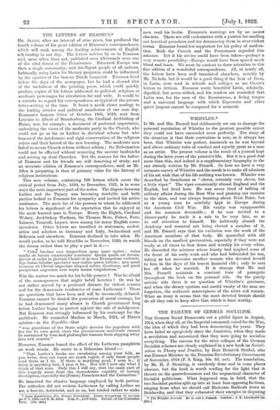THE LETTERS OF ERASMUS.*
Ma. ALLEN, after an interval of nine years, has produced the fourth volume of his great edition of Erasmus's correspondence, which will rank among the leading achievements of English scholarship in our day. The letters written by or to Erasmus and, more often than not, published soon afterwards were one of the vital forces of the Renaissance. Educated Europe was then a single community, and intelligent people of all nations, habitually using Latin for literary purposes, could be influenced by the epistles of the famous Dutch humanist. Erasmus lived before the days of the newspaper, but he had a shrewd idea of the usefulness of the printing press, which could quickly produce copies of his letters addressed to political, religious or academic personages for circulation far and wide. It would be a mistake to regard his correspondence as typical of the private letter-writing of the time. It bears a much closer analogy to the leading articles and political manifestos of our own day. Erasmus's famous letter of October 19th, 1519, sent from Louvain to Albert of Brandenburg, the Cardinal Archbishop of Mainz, was, for example, a document of profound importance, embodying the views of the moderate party in the Church, who could not go as far as Luther in doctrinal reform but who lamented the intolerance and rigid conservatism of the religious orders and their hatred of the new learning.. The moderate men failed to secure Church reform without schism ; the Reformation could not be effected without removing the ancient landmarks and setting up rival Churches. Yet the reasons for the failure of Erasmus and his friends are still deserving of study, and an accurate edition of Erasmus's correspondence, such as Mr. Allen is preparing, is thus of primary value for the history of religious institutions.
This new volume, containing 259 letters which cover the critical period from July, 1519, to December, 1521, is in some ways the most important part of the series. The dispute between Luther and the Papacy was becoming insoluble and both parties looked to Erasmus for sympathy and invited his active assistance. The mere list of the persons to whom he addressed his letters is significant of the reputation that he enjoyed as the most learned man in Europe. Henry the Eighth, Cardinal Wolsey, Archbishop Warham, Sir Thomas More, Fisher, Foxe, Linaore, Tunstall, Lupset, were among his many English corre- spondents. Other letters are inscribed to statesmen, ecclesi- astics and scholars in Germany and Italy, Switzerland and Bohemia and elsewhere. Erasmus declined to take sides. He would prefer, as he told Reuchlin in November, 1520, to watch the drama rather than to play a part in it
•
" Vides fatalem ease tragoediam quae nunc agitur ; cuius quails sit future catastrophe inoertum. Qualls quails est futura, precor ut oedat in gloriam Christi at in rem Evangelical veritatis. Ego huius fabulae spectator esse =dim quam histrio ; non quod recusem ob Christi negocium aliquod subire discrimen, sed quod perspiciam negocium esse supra meam exiguitatem."
Was the matter too much for his feeble powers ? Was he afraid of the consequences that might befall heretics ? Or was he not rather moved by a profound distaste for violent courses and for the democratic tendencies of some Lutherans ? These are questions that have been and will be incessantly debated. Erasmus cannot be denied the possession of moral courage, for he had denounced many abuses in Church government long before Luther began to protest agtinst the sale of indulgences. But Erasmus was strongly influenced by his contempt for the multitude. He reminded Marlian in March, 1521, of Plato's opinion—in the Republic—that
"wise guardians of the State might deceive the populace with lies for its own good, since the promiscuous multitude cannot be restrained by true and philosophic reasons from slipping away into evil courses."
Moreover, Erasmus feared the effect of the Lutheran pamphlets on weak minds. He wrote to a Bohemian friend :—
" That Luther's books are circulating among your folk, as you write, does not cause me much regret, if only those people read them as I do. If there is anything good, I note it ; if there is anything bad, I pass it by. Nor will I now say what I think of that man. Only this I will say, that the main part of this tragedy arose from the immoderate cupidity of certain theologians, especially the [Friars] Preachers and the Carmelites."
He lamented the abusive language employed by both parties. The orthodox did not reclaim Lutherans by calling Luther an ass, a heretic, Antichrist, and so on, but tended rather to make
• Opus Epistotarum Des. Erasrni Roterodami. Denuo recognitum et auctum per P. S. Alien and H. X. Allen. Tom. iv., 1519-1521. Oxford at the Cl arendon [288. net.] men read his books. Erasmus's warnings are by no means obsolete. There are still ecclesiastics with a passion for smelling out heretical preachers and for denouncing them in over-violent terms. Erasmus found few supporters for his policy of modera- tion. Both the Church and the Protestants regarded him askance. Yet if his advice could have been taken—perhaps a very remote possibility—Europe would have been spared much blood and tears. We must be content to draw attention to this fine edition of a wonderful correspondence. All, or nearly all, the letters have been well translated elsewhere, notably by Mr. Nichols, but it would be a good thing if the best of them, in Latin, were read in schools and colleges as are Cicero's letters to Atticus. Erasmus wrote beautiful Latin, scholarly, dignified, but never stilted, and his readers are reminded that Latin was, for the men of the Renaissance, a living tongue and a universal language with which Esperanto and other queer jargons cannot be compared for a moment.










































 Previous page
Previous page